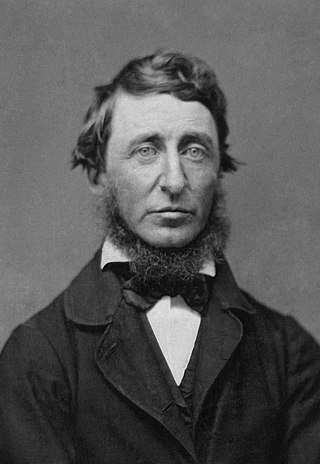Henricus David Thoreau
From Wikipedia, the free encyclopedia
Henricus David Thoreau (12 Iulii 1817—6 Maii 1862) fuit philosophus, naturalista, et auctor Americanus, qui duobus libris innotuit: Walden, seu Vivere in Silvis (Anglice 'Walden, or Life in the Woods') de simplicitate voluntaria in rebus rusticis (quod origo oecologiae habetur), et Inoboedientia Civilis (Anglice 'Civil Disobedience'), de inviolentia rei publicae iniustae reprehendenda, quae in servitute et Bello Mexicano detegit. Inter transcendentalistas numeratur, plerumque a Radulpho Waldo Emerson motus.
Res apud Vicidata repertae:


Nativitas: 12 Iulii 1817; Wheeler-Minot Farmhouse, Concordia
Obitus: 6 Maii 1862; Concordia
Patria: Civitates Foederatae Americae
Nomen nativum: David Henry Thoreau
Obitus: 6 Maii 1862; Concordia
Patria: Civitates Foederatae Americae
Nomen nativum: David Henry Thoreau
Familia
Genitores: John Thoreau; Cynthia Dunbar
Coniunx: no value
Coniunx: no value
Memoria
Sepultura: Sleepy Hollow Cemetery
Aliqua excerpta ex tertio capite libri Walden vocato 'De legendo'
Hoc fere modo Thoreau scripsit de beneficio litterarum antiquarum legendarum:
Homerum vel Aeschylum Graece scriptum sine periculo intemperantiae luxusque discipulum legere licet, nam is quodam modo heroes imitari et cum eis mane agere habetur. Libri heroici, quamquam in litteris linguae hodiernae impressi sunt, temporibus deterioribus semper mortui sunt; significationem omnium verborum et versuum laboriose petere debemus, coniectantes ex nostra sicut sapientia virtute liberalitate sensum maiorem quam eum quem usus communis permittit. Hodierna imprimatio, vilis et fertilis, plena libris translatis, haud propius ad scriptores antiquos heroicos nos tulit. Hi scriptores esse solitarii semper videntur, et linguae eorum tantae rarae mirabilesque videntur quantae semper videbantur. Diebus iuvenilibus et horis pretiosis dignum est discere pauca saltem verba linguae antiquae, quae ex viis quotidianis sublata sunt, quae consilia et stimuli sunt. Pauca verba Latina quae audivit agricola haud frustra meminit iteratque. Homines nonnumquam putant litteras classicas cessuras esse studiis modernioribus utilioribusque; sed discipulus audax litteris classicis, quacumque lingua et quocumque tempore scriptis, semper studebit.
The student may read Homer or Æschylus in the Greek without danger of dissipation or luxuriousness, for it implies that he in some measure emulate their heroes, and consecrate morning hours to their pages. The heroic books, even if printed in the character of our mother tongue, will always be in a language dead to degenerate times; and we must laboriously seek the meaning of each word and line, conjecturing a larger sense than common use permits out of what wisdom and valor and generosity we have. The modern cheap and fertile press, with all its translations, has done little to bring us nearer to the heroic writers of antiquity. They seem as solitary, and the letter in which they are printed as rare and curious, as ever. It is worth the expense of youthful days and costly hours, if you learn only some words of an ancient language, which are raised out of the trivialness of the street, to be perpetual suggestions and provocations. It is not in vain that the farmer remembers and repeats the few Latin words which he has heard. Men sometimes speak as if the study of the classics would at length make way for more modern and practical studies; but the adventurous student will always study classics, in whatever language they may be written and however ancient they may be.[1]
Notae
Bibliographia
Nexus interni
Nexus externi
Wikiwand - on
Seamless Wikipedia browsing. On steroids.

